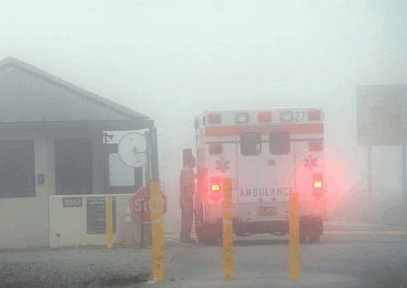
For more than seven years, Jeremy Courtney and his family have lived in Iraq, working with the Preemptive Love Coalition, an organization he founded to meet the needs of communities who have suffered under years of conflict. The years of war in Iraq have destroyed much of the country’s medical infrastructure, creating a backlog of young patients who urgently needed surgeries. Initially, the primary mission of Preemptive Love was to provide training to Iraqis in pediatric cardiac care, so children could receive the life-saving surgeries they needed. This summer, RELEVANT spoke with Courtney about how Preemptive Love’s programs have expanded to also help communities affected by the conflict with ISIS. RELEVANT readers and podcast listeners responded by supporting Preemptive Love, generously donating to the organization’s emergency response efforts.
We recently caught up with Courtney, who discussed the situation in Iraq, the American media’s response to ISIS and how his organization is changing lives throughout the country.
Many of the videos released by ISIS have depicted the executions and kidnappings of Christians. But there are also Muslims communities facing a tremendous amount of violence. Does it seem like that element of the story has been underreported?
It has absolutely been underreported. I fear many Christians have chosen to engage in a brand of tribalism that implies the only people who really matter to us are our kinds of people, namely Christians.
This fixation among the Christian community in America that celebrates martyrdom in moments like this and frames it as some kind of apocalyptic prophecy come true—yet fails to acknowledge the Muslims being killed by the same guns, swords and fires—it misses the point entirely.
The concerning thing to me about the situation is how inconsistent it is. Most people back home in America are rightly concerned about the deaths of Christians in Iraq. I am concerned about the Christians in Iraq, Syria and Libya. But the Christians that we in America have chosen to be so concerned about, are in some cases the very kinds of Christians that we would normally not associate with in America. We split hairs between over minor denominational and theological differences!
On a global stage, a Coptic Christian from Egypt is killed in Libya and suddenly we act like Coptic Christians are our kind of people—ISIS is killing our people! Never mind the fact that just prior to the breakout of ISIS in mid-2014, missions agencies and churches were actively teaching that Coptic Christians, Chaldeans, etc. are not real Christians and needed to be converted by evangelical missionaries in order to become “real believers”! It’s just wildly inconsistent.
So, in some ways, I’m really happy to see a broader, global inclusiveness for all who identify with Christ. But I’d like to see us experience that same kind of unity at home where we tend to be so deeply concerned over people who are different from us—whether Muslim, Baptist, Catholic or Orthodox Christians. It would be interesting to see how much more powerful the Christian community in America became if we applied the same kind of blanket inclusiveness back in America that we seem so eager to apply on the global stage right now.
I fear the only reason we’re being so inclusive with global Christians is because we can do it vis-a-vis Muslims. We always need an enemy. And on the global stage we’re able to make Muslims out to be the enemy. But when we bring it back home, many of us don’t know the Muslims in our own backyard. So it’s easier to make our Methodist, Baptist, Catholic, Orthodox neighbors the enemy, because we don’t have the convenience of making ISIS the enemy in small town middle America.
It’s almost like the intention of ISIS is to pit Christian against Muslim, and it’s unfortunately working in some Christian circles. Some in evangelical communities, they see this as Christian versus Muslim, not realizing that a lot of the victims are also Muslims.
Yeah, and I think we’re all contributing to that. Around the same time 21 Coptic Christians were beheaded on a beach in Libya, ISIS was burning some 45 Muslims in Iraq. Even though the Muslim death toll was two times greater than the Christians who were killed in Libya, no one got up in arms about it. No one created a website called 45 martyrs for the Muslims. No news stories really ran about 45 Muslims being burned alive, but there was endless play of the 21 Christians killed.
Again, I’m just suggesting it’s wildly inconsistent, and it actually says something about us. The news is just doing what the market tells it to do. So why are we telling our news producers that this is the story we want to hear? Why are we telling them we care twice as much about Christians who die than Muslims? I think we need to work harder to say all lives matter, and we need to hear both of those stories.
This is not in any way to diminish the loss of Christian lives in Iraq, Libya, Syria or wherever. They matter greatly to me, but so do my Muslims friends, my Shabak friends, my Yazidi friends and everyone else in between.
There seems to be an attitude in the U.S. that more military intervention is something that Christians should advocate for. But obviously, it’s an incredibly complex issue.
I’m not confident that sending a lot more troops, aid or guns is going to solve anything quickly, though it may prove to be necessary. In any case, I would suggest that we try to separate political expedience or national interest responses from Christian responses. So if the U.S. government deems it necessary—in coordination in the Iraqi government—to send more firepower, I get that. I understand why two nations would make that decision. I would understand why all of the parties involved would think that that’s exactly what’s needed, and it may be exactly what’s needed.
But, to conflate that with a Christian response, I see that being very unhelpful, and I think it ends up drawing us into a really harmful religious war when we should want Muslims to understand that we are not like ISIS. I just don’t think you can make a strong “Christian case” for killing Muslims—for killing anyone. I do think you could make a strong American case for that. I think you could make a strong Iraqi case for that. I don’t think you can make a Christian case for that. Of course, in saying “Christian,” I mean that which flows from the life and teachings of Jesus Christ and is enjoined on His followers … not the imperial religion that developed centuries after Christ.
The RELEVANT community has been privileged enough to be able donate to support what your organization, Preemptive Love, is doing. Can you talk a little bit about how that aid affects people’s lives there?
There are hundreds of thousands of people who live outside of the scope of coordinated emergency aid. So we decided, we’re small, we can’t do as much as a huge organization if we throw in our lot with them. But if we’re willing to go outside of the safety of city gates, so to speak, and to go to some of least-reached places of Iraq, then we’re going to be able to help people who no one else is reaching.
We’re just coming out of the harshest part of winter. We’ve been providing coats, clothing, shelter, kerosene and fuel that families displaced by ISIS can use for heat and cooking. We provided food, hygiene products for women, assistance devices to the crippled and elderly. We’ve been able to shore up a little bit of hope and help sustain families here in the harshest of winter.
Now we’re trying to turn a corner. No one wants a handout forever. None of these people want to be on our welfare systems, but they needed a little bit of help to make it through winter. What people really want is independence and dignity and freedom to make of their own lives whatever they want.
So we are turning a corner from this kind of emergency aid response to a long-term economic development response. Over the last couple of weeks we started 14 businesses thanks to the help of the RELEVANT community: 14 businesses headed by 14 different women who lost their husbands or the eldest male in their family during the ISIS crisis—whether they were running from ISIS, went back to fight ISIS, went back to try and free women who had been kidnapped by ISIS, or even went back to fight for ISIS—we’re honored to to be supporting at-risk women and children.
These women are not only providing for their children and their extended family, but soon, with enough success, they’ll be providing for their community and injecting a really good service into the neighborhood where they settled. That will allow them to rebuild their lives and hopefully help hundreds of thousands of people to come.
All the while, we are still providing lifesaving heart surgeries for children across Iraq.
To donate to the work being down in Iraq and learn more about Jeremy’s organization, visit PreemptiveLove.org.






















